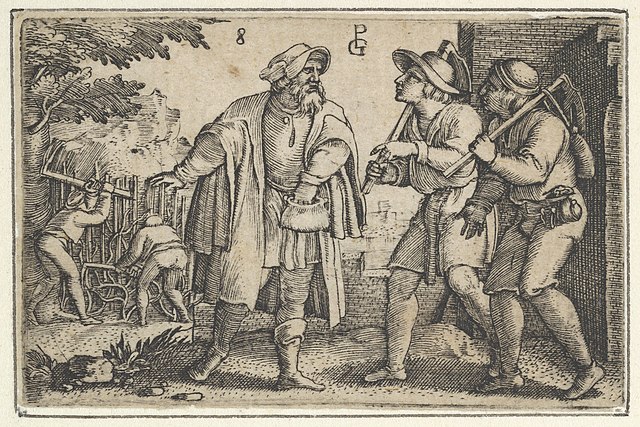Readings: John 15:9-17 , Revelation 2:1-7
Bramley St Peter, 22 October 2022
5th & last In a series on ‘Whole Life Worship’

Several years ago Linda and I bought a pair of silver-plated champagne flutes to help celebrate special occasions. But we don’t often have such a special occasion, and having champagne is a very rare treat. So the flutes get left at the back of a cupboard most of the time. This is one of them. It doesn’t look very attractive or inviting, does it? When silver gets to look like that, we call it ‘tarnished’. All that’s happened is that it’s reacted with sulphur in the air around it. You could still drink from it, but it doesn’t add sparkle to the occasion.
One of the lessons that life teaches us is that things decay, get spoilt or tarnished, without us doing anything deliberate to harm them. Often, that decay happens when they aren’t even being used. Think of the way that anything dyed red fades to pink and eventually white as it’s exposed to sunlight. Or the way that the lovely cream coloured York stone from which many of the building of Leeds were built has turned black with a century or more of air pollution. Polluted, faded, tarnished – things just don’t look as attractive as they once did.
The same thing happens to our relationships. Relationship counsellors know that the most common reason for a couple seeking counselling, or a divorce, is not something serious like an affair, but just that they’ve ‘drifted apart’ or ‘no longer love each other’. What causes this? Most often, it’s just the everyday activities of living. We get so busy with work, family commitments, even church activities, that we forget to set special time aside for the people closest to us, even our intimate partner. The relationship gets tarnished – it can still function, but the sparkle has gone and other friendships may seem more attractive. Keeping the love alive in a relationship to stop this happening is important, but also challenging.
And that’s true of our relationship with God as well. When we first discover what it is to believe in God, to be saved by Jesus, to be able to worship him and praise him for what he’s done for us, then our worship and praise will be heartfelt and sincere. It makes us feel good, and we are motivated to live out our Christian faith in daily life, and take opportunities to tell other people what God has done for us.
But like a goblet or building exposed to the air around it, slowly and bit-by-bit we find our worship gets polluted by the concerns of life and the sparkle goes out of it. As Jesus said of the seed that grew up among thorns, we get “choked by the cares and riches and pleasures of life”. Some people will fall away and slowly drop out of worshiping together in church. Others still come to church out of a sense of duty or because we have friends here, but one service seems much like another and it doesn’t engage us with the rest of our life.
In the reading from the book of Revelation, the risen Jesus sends a message in a vision to the the Christians in Ephesus, saying “I have this against you, that you have abandoned the love you had at first.” Elsewhere in the same book, Jesus warns against being ‘lukewarm’ for him. It’s the same idea: our worship of God and our love for him should not be lukewarm, half-hearted. As with our personal relationships, we need to face up to the challenge of finding ways of keeping our love for God alive.
This is the last of our services on the theme of ‘whole life worship’. We have looked at how worshipping should engage our whole lives, how it offers us insights into life, affects our everyday actions and speech. The question today is how we can polish up our worship, remove the layer of pollution from it and be the sparkling silver people that Jesus wants us to be.
When Jesus addressed his closest disciples at the Last Supper, on the evening before he was crucified, he said many important things that they would remember and write down later. He spoke a lot about love, that evening. In today’s reading he distilled that down to this: “As the Father has loved me, so I have loved you; abide in my love. If you keep my commandments, you will abide in my love, just as I have kept my Father’s commandments and abide in his love.” The commandment that we have to keep, he went on to say, is to love one another, just as he has loved us, that is, loving to the point of being willing to sacrifice his own life for us. But he also said that the point of giving the commandment to love each other, is in order that we may love each other.
That, then, is the key to the challenge that we face – to love as Jesus loved us. If only we could love each other, and our neighbours, with the intensity of love that led Jesus to lay down his own life for others, then we would truly be living like Christ and having a transforming impact on the world around.
It seems an impossible ask. But the good news, the amazing truth at the heart of the Christian message, is that Jesus did not leave us alone. “I have said these things to you”, Jesus added [that is, about loving each other] “so that my joy may be in you, and that your joy may be complete”. Loving and serving each other as part of Christ’s body is not a solemn, boring duty: it should be a source of joy, just as the love between parent and child or two lovers.
You may recall from the first of this series on whole-life worship another of Jesus’ memorable sayings: that he is the living water. That is, flowing, fresh water that bubbles up inside us like a spring, refreshing and reviving. When he was faced with someone arguing about where was the best place to worship God, he replied that what matters is worship ‘in spirit and truth’. Worship from the heart.
There is a virtuous circle here: the more we worship God from the heart, the more Jesus will pour his living water of joy into us to refresh our lives and move us to loving service of our neighbours in God’s name. And the more we do that, the more people’s lives are transformed. When we see lives transformed, it motivates us to come back to God in praise and worship. And so on. Worship – joy – service – transformation- worship.
But how do we get that virtuous circle going? To change the metaphor slightly, think of a petrol engine. The piston goes up and down in a cycle, but the car won’t move unless fuel is injected into the cylinder at a crucial point in the cycle. When it comes to this virtuous cycle of worship, inspiration and loving service, I think it has to start with worship. That’s the point in the cycle where Jesus injects us, as it were, with the fuel of love.
But we have to be prepared – the ignition has to be on. Worship of God “in Spirit and in truth” can’t just start from cold, we have to do some warm-up by preparing for worship in prayer, asking the Holy Spirit to make our worship real and heartfelt. We see this in the prayer sometimes used at the start of the communion service: “cleanse the thoughts of our hearts by the inspiration of your Holy Spirit, that we may perfectly love you, and worthily magnify your holy name”. But we can also do that preparation of the heart before coming to church, day by day as we pray at home.
If we can do that: if we can prepare ourselves to experience true worship from the heart, so that we know the joy of Jesus’ love within us, and go out rejoicing in his name to love each other and transform the world by loving service, returning week by week to praise God for what he is doing through us: then we will no longer be like this tarnished old goblet, but shining like fresh silver, worthy to receive the living water of Christ and the sparkling wine of the Holy Spirit. Amen.
